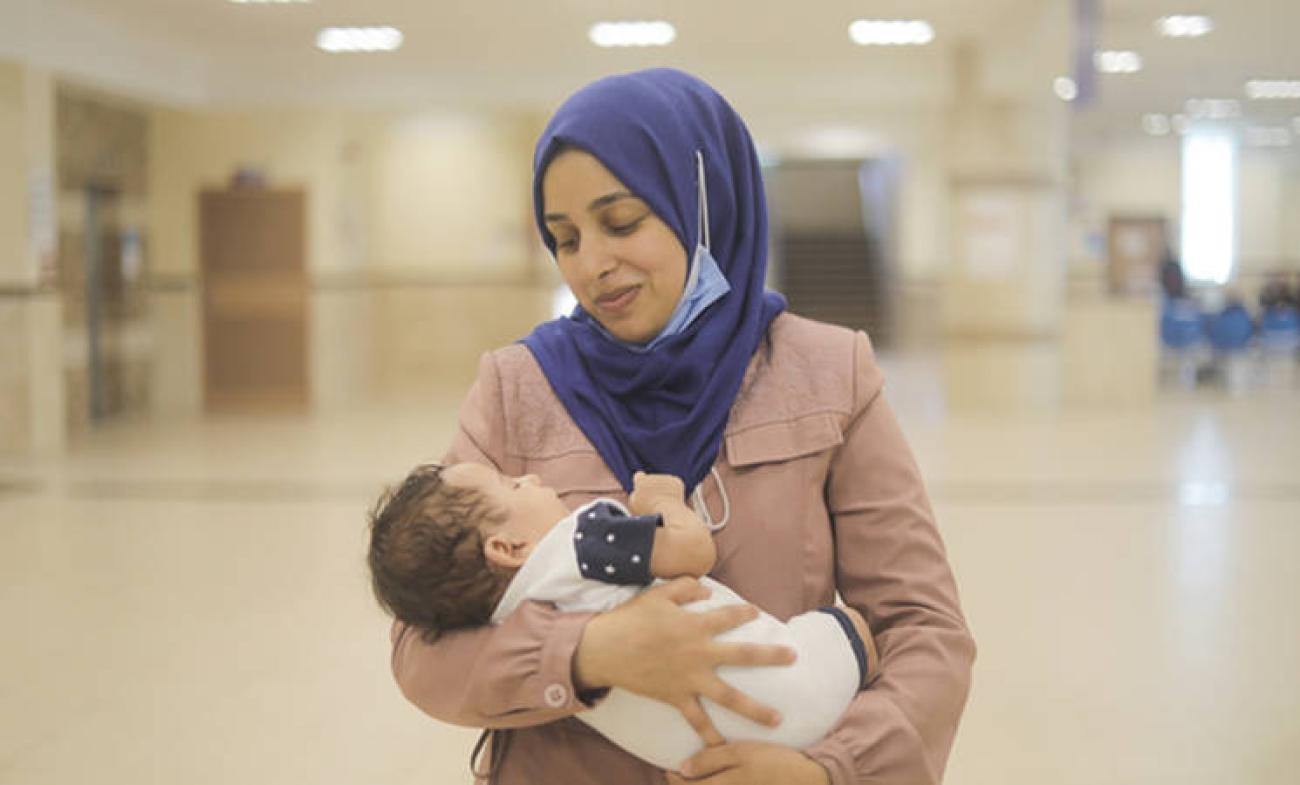Dreams of motherhood realized: a Palestine refugee in Gaza risks her life to bring new life to the world

“I was six months pregnant when my heart stopped,” said Suad Jarad, a 21-year-old Palestine refugee woman in Gaza.
Suad always knew she wanted to be a mother. When she miscarried during her first pregnancy her desire to be a mother only became stronger and she tried again soon after. Suad never thought, not even in her worst nightmares, that she had a cardiac disease which would threaten her ability to have children.
“I was in my sixth month of my second pregnancy when I suddenly fainted. I had a heart attack and I went into a coma. Doctors told my husband that if I wake up, I would either be paralyzed or suffer memory loss. I woke-up and was in good health. I was able to walk and remembered everything except the day of my heart attack. Now, I have a cardiac pacemaker implant. My doctors made it clear that pregnancy would put my life at risk and that I might die even before I deliver my baby. They advised me to have an abortion. But I insisted on keeping my baby. I could not go through with [an abortion] after I’d felt his heartbeats and the movement of his feet. Unfortunately, I lost him during delivery,” Suad says.
As a Palestine refugee, Suad benefits from the primary health care offered by UNRWA through its health centres all over the Gaza Strip. When Suad found out she was pregnant with her third child, she immediately went to the UNRWA Sheikh Redwan Health Centre. Constructed and supported thanks to generous funding from the Kingdom of Saudi Arabia through the Saudi Fund for Development, the health staff at the Centre were familiar with Suad. “I came to the Health Centre the moment I realized that I am pregnant. I trust the staff here,” said Suad.
Bolstered by her trust in the UNRWA health team who were providing her with care. Suad insisted on keeping the baby and risking her life to be a mother. “I wanted to hear my baby’s voice. Even if for few moments, even if it cost me my life. I wanted to feel the sanctity of motherhood. However, I told my doctors that I am sure that I will deliver a healthy baby and see him growing up. And that I would raise him myself. I felt it, I was not going to die,” added Suad. While the doctors at the Health Centre respected Suad’s choice to go ahead with the pregnancy, she was placed on a high-risk pregnancy roster. She was provided with basic care information as well as a customized follow up health care plan. In addition, an on-call cardiac specialist was present for Suad’s needs. In addition, she regularly underwent periodic laboratory tests to monitor the health of Suad and the fetus.
“On top of the usual health care services provided by UNRWA health staff to women during pregnancy, the health team paid additional attention and care to me. They treated me like family. They always called me to check on me, the calls were daily during some periods of my pregnancy.
“When Suad came to the health centre pregnant, we assigned an on-call cardiac specialist to her. Protecting her life was our main target, a goal all of us at the Health Centre worked for,” said Dr. Sanaa Najar, Suad’s doctor and the head of the UNRWA Sheikh Redwan Health Centre.
When I reached full-term in my pregnancy, I went to the West Bank for my cesarean section operation. Even though I was no longer in Gaza, the health team called me before, during and after the surgery. I felt so supported! I was sure that I would be fine and that I would get the chance to thank them myself in person,” she added.
“I delivered my son Ahmed on 12 April 2021, he was a healthy baby. It was the happiest day in my life. When I look at his face, I realize that he was worth the risk. Nothing is more sacred than motherhood,” said Suad. Dr. Sanaa Najar, adds, “I believe that Suad was reborn when she delivered her baby.” Over the years, vital support from the Kingdom of Saudi Arabia has enabled funding for food aid, infrastructure and health-related projects through the Saudi Fund for Development and KSrelief. Totaling more than US$ 800 million in contributions, this funding has also enabled for the reconstruction and repair of some 250 damaged Palestine refugee homes in the Gaza Strip, in addition to the aforementioned aid programmes.
Over the years, the strong support of the Kingdom has enabled for the funding to programmes such as food aid, infrastructure and health-related projects by the Saudi Fund for Development and King Salman Centre, totaling more than US$ 800 million in contributions. This funding has enabled the reconstruction and repair of some 250 destroyed Palestine refugee homes in the Gaza Strip.



